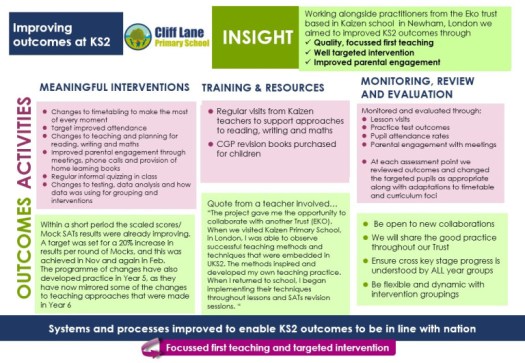Finding a solution for the continuation of school career support – regular and ongoing support through wider partners is needed to ensure all schools continue to make good progress and to understand the changing landscape of new opportunities and initiatives.
#800
Raising Standards at KS2
Tailored support for school leaders and teachers to improve outcomes in Reading, Writing and Maths at key stage 2.
Audience
Head Teachers / School Leaders, Local Authorities, School Teachers, TrustsAimed at
KS2Outcome
Leadership, Literacy, Numeracy, Raising AttainmentApproach
Whole SchoolWhy was the project needed?
- Data identified some schools in Ipswich were showing underperformance in KS2 Reading, Writing and/or Maths.
- KS2 curriculum, systems and routines needed a systemised approach in each school.
- Pedagogical development was identified as a key need across some of the schools.
- Since the removal of levels, a new assessment system needed to be established in some cases.
What happened and what was the impact?
EKO Trust developed tailored support for 11 Primary schools across Ipswich. These schools were originally identified from progress data, although quite often the area for which they were identified was not the basis for their project of support.
EKO worked with the schools to identify areas that the support would have the most impact for students and sustainable impact across the schools.
The following steps were implemented:
- Development of a systemised approach to assessment and data analysis which focused on attainment and progress.
- Work with leaders to use data at regular intervals to conduct an analysis and identify children vulnerable to underachievement.
- Creation of an action plan (including the use of human resources and development of teaching).
- Development of individualised attainment and progress target.
- Support for teachers and TAs to ensure they have effective resources/practices/strategies to enhance and refine their skills of teaching and learning and assessment practices through CPD in a range of forms.
- Enhanced capacity of SLT by supporting them to develop the quality of teaching, learning and assessment to support this raise in standards.
- Support for leaders in ensuring that underperformance is tackled in a swift and supportive way with timed targets and clear aspirational expectations.
- Development of a rigorous monitoring and evaluation system to review teaching and learning as well as outcomes of pupils to ensure practice matches expectations and addresses weaknesses via action planning to attain the next milestone.
- Quality assurance and action planning of learning provision for KS2 in each school to ensure that the teaching and learning provision that pupils receive is consistently good or better.
- Review and refinement of the curriculum with leaders of each school to ensure that it successfully meets the needs of pupils.
What did and didn't work?
Tailoring support to the needs of the school will get better outcomes than fixed interventions. All schools surpassed the benchmarks set. Although there were no SATs for KS2 to give hard data evidence of the impact, all schools reported significant improvements in their Reading, Writing and Maths assessments.
Maximise student learning and thriving:
- Review timetable to ensure that pupils’ learning is consistent whether they are learning at home or at school.
- Ensure that the curriculum is targeted and is meeting the needs of all pupils.
- Embed ‘low stakes’ testing to ensure retention and inform planning.
- Review CPD to ensure that it is flexible and focuses on effective delivery.
- Develop system for monitoring pupil well being.
- Set up assessment and target setting processes that meets the needs of the school and enables monitoring of standards across the school.
Support teachers and staff to adapt to the new reality:
- Allocate staff roles in line with government directives on social distancing.
- Develop cover protocols and structures for staff sickness (non-COVID and COVID).
- Ensure that leaders at all levels understand their role and how to be effective, and what they are and are not responsible for.
- Ensure that staff wellbeing is prioritised.
- Ensure appraisal system supports staff well-being and maximise students learning.
- Develop interim expectations to clarify expectations and accountability for teachers and support staff.
Lessons learnt and recommendations for future projects:
- Ensure that schools have clarity as to the purpose and proposed outcomes before engaging with new projects.
- Ensure that the overarching project plan is personalised effectively for each school.
- Consider how to capture views of all stakeholders.
- Make sure that plans are always made with the HT input and true to the schools’ school improvement priorities.
- Focus on quality not quantity – some schools were potentially overwhelmed by the amount of support being offered and implemented.
- Employ coaching techniques with school leaders to maximize the impact of the project delivery.

Wisdom
Ingredients For Success
Investment
£95,000 across 11 schools equating to £8,600 per school.
Area Most Impacted
Improving Attainment
Next steps to do something similar yourself
Read the EEF Guidance Report on Improving Literacy in KS2 here
Read the EEF Guidance Report on Improving Maths in KS2 and 3 here
Read the EEF Guidance Report on Using Digital Technology to Improve Learning here

If you've got any thoughts and ideas of how this approach could be improved or an positive impact it's had for you, add them below
Login or register now to post any comments